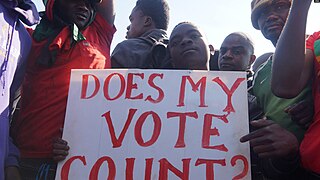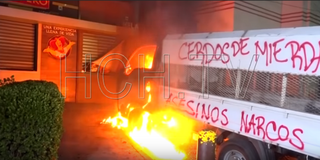Related Research Articles

Edi Rama is an Albanian politician and painter who has been serving as the 33rd and incumbent prime minister of Albania since 2013 and chairman of the Socialist Party of Albania since 2005. He was Minister of Culture, Youth and Sports from 1998 to 2000. First elected mayor of Tirana in 2000, he was reelected in 2003 and 2007.

In 1997, Albania experienced widespread civil unrest due to economic problems caused by the collapse of pyramid schemes. The large sums of money siphoned from the government to fund these schemes led to the collapse of the Democratic Party's government in January 1997. The conflict, which lasted until August 1997, resulted in the deaths of more than 2,000 people. The establishment of a new government occurred as revolutionaries surrounded Tirana. Various sources also describe the ensuing violence as a rebellion or even a civil war.
In 1991, the Socialist Party of Albania, with specific social democratic ideology took control of the country through democratic elections. One year later the Democratic Party of Albania won the new elections. After 1990, Albania has been seeking a closer relationship with the West. What followed were deliberate programs of economic and democratic reform, but the implementation of capitalism led to the proliferation of pyramid schemes. Chaos in late 1996 to early 1997, as a result of the collapse of these pyramid schemes, alarmed the world and prompted the influx of international peacekeeping forces. In 1995, Albania was accepted into the Council of Europe and requested membership in NATO and is a potential candidate country for accession to the European Union. The workforce of Albania has continued to emigrate to Western countries, especially Greece and Italy.

The Jordanian protests were a series of protests in Jordan that began in January 2011, and resulted in the firing of the cabinet ministers of the government. In its early phase, protests in Jordan were initially against unemployment, inflation, corruption. along with demanding for real constitutional monarchy and electoral reforms.

The 2011 Albanian opposition demonstrations were a series of anti-government protests in cities around Albania following 18 months of political conflict over alleged electoral fraud by the opposition. A video surfaced which portrayed the deputy prime minister arranging a corrupt deal with the minister of economy. The public outcry over the video resulted in the resignation of the deputy prime minister, Ilir Meta. A demonstration was called by parliamentary opposition parties, which include the Socialist Party and the Unity for Human Rights Party. These were called on 21 January in order to protest the alleged corruption of the Albanian government as well as widespread unemployment and poverty in the country.
The Fino Government better known as the Government of National Reconciliation was a caretaker government that presided over Albania from 13 March 1997 to 24 July 1997, during the Albanian unrest of 1997. It was created as a result of the social, economic, and political turmoil of early 1997, spurred by the collapse of pyramid schemes and the subsequent loss of many Albanians' life savings. This government was formed in the week following the resignation of the government of Aleksandër Meksi on 1 March 1997 by the major political parties of the country with international support. The Government was voted in the morning session at 10:00 a.m. on 12 March 1997, while received the approval of the President Sali Berisha shortly before midnight on the same day.
A political crisis evolved in Tunisia following the assassination of leftist leader Mohamed Brahmi in late July 2013, during which the country's mainly secular opposition organized several protests against the ruling Troika alliance that was dominated by Rashid al-Ghannushi's Islamist Ennahda Movement. The events came as part of the aftermath of the Tunisian Revolution which ousted the country's longtime president Zine El Abidine Ben Ali, followed by a general election which saw Ennahda win a plurality alongside Moncef Marzouki's allied Congress for the Republic (CPR). The crisis gradually subsided when Prime Minister Ali Laarayedh resigned and a new constitution was adopted in January 2014.
In May 2015, protests occurred in Skopje, Republic of Macedonia, against the incumbent Prime Minister Nikola Gruevski and his government. Protests began following charges being brought up against Zoran Zaev, the Social Democratic opposition leader, who responded by alleging that Gruevski had 20,000 Macedonian officials and other figures wiretapped, and covered up the murder of a young man by a police officer in 2011. A protest with up to 2,000 attendees occurred on May 5, seeing clashes between activists and police.

The 2017 Albanian opposition protests were a series of anti-government protests, largely in Tirana, which centered around poverty, corruption, the illicit drug situation in Albania, fear of electoral fraud in the parliamentary elections, and alleged manipulation of the voting process by the government.
Starting from 16 February 2019, the opposition parties organized a series of protests and rallies against the government to demand new elections and the formation of a technocrat government that would ensure the fairness of the electoral process, citing electoral fraud and corruption in the government as the main reasons for the need for change.

The sentencing of nine Catalan independence leaders in a 2019 trial by the Supreme Court of Spain triggered protests in Catalonia. They were convicted of sedition and other crimes against the Spanish state for their role in the organization of the 2017 Catalan independence referendum.

The 2019 Malawian protests were a series of nationwide rallies and strikes about government pensions, the results of the 2019 Malawian general election and demands for democratic reforms. Anti-presidential unrest was met with police violence against demonstrators. Soon, they used live rounds, tear gas and batons to disperse protesters who protested for three months against the president.

The 2019 protests in Honduras corresponded to a series of protests and riots that occurred in October, that called for the resignation of President Juan Orlando Hernández; this as a direct consequence of the trial on drug trafficking charges against his brother Tony Hernández, carried out in the United States. These protests first were against the privatisation of health and education then soon turned into an anti-government revolt that has killed dozens of people.

The 2019–2020 Guinean protests, or the Front National pour la Défense de la Constitution (FNDC), were a series of violent protests and mass civil unrest around Guinea against the rule of Alpha Condé that first broke out on 14 October 2019 against constitutional changes. More than 800 were killed in violent clashes and political scenes yet ethnic clashes and this spawned even further rhetoric, while the protesters still resisted despite the harsh repression. After the 2020 Guinean presidential election, widespread unrest took place, leading to the deaths of 27 protesters.
The 2020 Ivorian protests were a series of massive rioting and increasingly violent street demonstrations adding to the growing massive street protests and civil disorder sweeping Ivory Coast. The protests were against the results and the re-run of president Alassane Ouattara. These protests were major anti-government opposition protests, and consisted of supporters of opposition protests in Abidjan and other cities in support of democratic reforms. Protesters used nonviolent tactics but met with intense violence back from the riot police.

The 2019 Benin protests was a widespread popular uprising and post-election conflict after the opposition was barred from running in the 2019 Beninese parliamentary election in Benin.
The 2003 protests in the Dominican Republic consisted of mass protests, rioting, labor unrest, strikes, demonstrations, rallies, marches, and a protest movement in Dominican Republic between July-November 2003, calling for economic reform despite the economic crisis and financial turmoil, one of the main causes of the political uprising. The movement and uprising were calling for the government of Hipólito Mejía to resign amid popular pressure and anti-presidential opposition on the streets.

The 2021 Paraguayan protests were a series of mass protests and violent demonstrations against the government's response to the COVID-19 pandemic in Paraguay during March 2021, calling for the resignation of Mario Abdo Benítez and his entire cabinet. The demonstrations left hundreds injured and many critically wounded after citizen protests and looting across the country. It resulted in the resignation of health minister Julio Mazzoleni.
Events in the year 2023 in Albania.
Events in the year 2024 in Albania.
References
- ↑ "Protesters in Albania again demand Prime Minister Rama quit". DW News. 9 July 2019.
- ↑ "Protests Against Rama's Government Turn Violent in Albania". BalkanInsight. February 16, 2019.
- ↑ "Violence Flares in Albania Opposition Protest". BalkanInsight. June 3, 2019.
- ↑ "Albanian elections cancelled in midst of anti-government protests". Euronews. 11 June 2019.
- ↑ "Albanian protesters clash with police in election dispute". Euronews. 20 June 2019.
- ↑ "Clashes erupt as protesters try to storm Albanian parliament". TRT world. 28 March 2019.